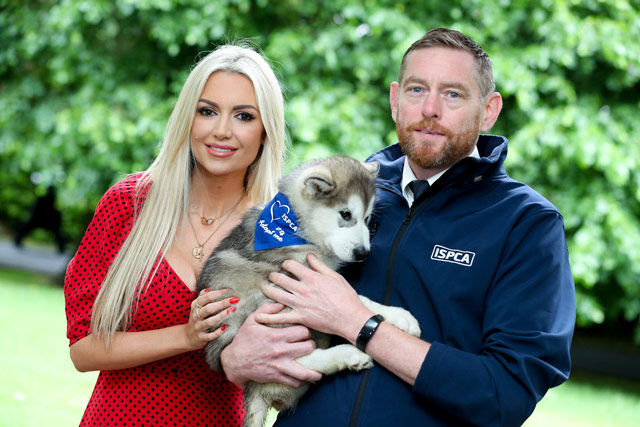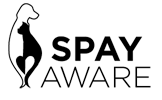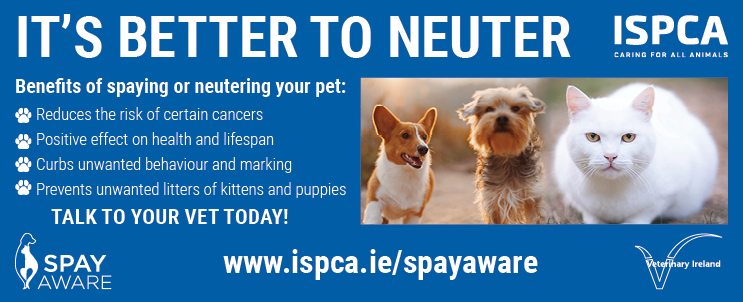NEWS
ISPCA launches SpayAware campaign encouraging pet owners to do what's best for their pet(s).
The ISPCA is appealing to pet owners to spay or neuter their pets as early as possible, emphasising the positive benefits and the most effective way to help control pet overpopulation. The charity is asking the public to talk to their vet as soon as possible.
Dr Pete Wedderburn, ISPCA director, veterinary surgeon and journalist said: "It is so important we prevent family pets from having accidental litters of puppies and kittens and if young adult animals are spayed or neutered before they can breed, surprise pregnancies won't happen. Generally, kittens should be neutered or spayed when they're four months old and puppies before they're six months old, but its important pet owners contact their vet for advice, to discuss dog breed specific recommendations and the positive impact this small operation will have on individual animal behaviour and health. The SpayAware campaign is a great time to encourage pet owners to get the procedure done and don't wait to do what's best for your pet" said Pete.

Best-selling author and model Rosanna Davison along with comedian and radio presenter PJ Gallagher is supporting the ISPCAs message highlighting the benefits of neutering and spaying. "We can all make a difference by being responsible and doing the right thing for our pets by getting them spayed or neutered as early as possible. You will be giving your pet(s) the best chance of a longer, healthier, and happier life."
Pete added:"SpayAware has the continued support of Veterinary Ireland, with many veterinary practices providing fact sheets in animal clinics and surgeries across the country. The over-riding message is simple. When you get a young dog or cat, be sure to discuss spaying or neutering with your vet. Your male pet may be less aggressive towards other cats and dogs and less likely to try and wander. Spaying or Neutering is important for two reasons: first, for the sake of your pet's health and behaviour, and second, to help combat Ireland's resurgence in overpopulation of cats and dogs."
ISPCA CEO, Dr Cyril Sullivan said: "In nearly every case, spaying and neutering has overwhelmingly positive benefits for pets, but it also prevents accidental litters of unwanted kittens or puppies, that places a significant drain on the charity's resources, when trying to source responsible new homes. We have a serious canine overpopulation situation, as many people who got a dog or a puppy during the pandemic, now have found their circumstances have changed and sadly, are looking to surrender their pets for various reasons, but mostly due to the cost-of-living crisis." Cyril added, "one solution to the dog over population is to ensure pets are spayed or neutered which will go a long way from unwanted litters of puppies and kittens from being born in the first place. If anyone is considering getting a dog or puppy, please consider adopting one."
The ISPCA is also recommends anyone thinking about getting a new pet to give a rescued animal a chance by adopting a dog or cat from the ISPCA or another animal welfare charity. All ISPCA rescued cats and dogs will already be spayed or neutered and puppies/kittens will be when they are old enough. For more information about adopting a dog from the ISPCA, visit https://www.ispca.ie/rehoming/dogs_rehoming/
Some facts about the benefits of spaying and neutering your pet:
- Spaying reduces the risk of mammary cancers in female dogs from 70% to 0.5% if they are spayed before first heat.
- Un-spayed cats are seven times more likely to develop mammary cancers than those spayed at puberty. 80% of feline mammary tumours are malignant.
- Testicular cancer is the second most common cancer among male dogs. Neutering eliminates that risk.
- Neutering reduces fighting and unwanted territorial behaviour in male cats by over 80%.
- Spaying/Neutering is a very simple procedure completed under anaesthetic and the recovery time is usually very quick. Your cat or dog will need to be dropped off at the vets, and picked up again later that same day.
- Puppies should be neutered or spayed at five to six months of age, though large or giant dog breeds require more time to develop so you should always seek advice from your vet.
- Kittens should be neutered or spayed at four months of age.
SpayAware QA and Posters can be found here for downloading.
Research was carried out by the ISPCA on the Perceptions of Responsible Dog Ownership in Ireland*. Respondents were asked to indicate a list of scenarios on the necessity and health impacts of neutering, and the appropriate age and here are the findings.
- Over 60% agreed with the statement that neutering is necessary even "when the dog is confined to the home/is always supervised".
Non-dog owners (potential dog owners) expressed uncertainty regarding some aspects of neutering, such as:
- Whether or not neutering is appropriate when the dog is younger than six months (males = 52%, females = 56%).
- Whether or not neutering is necessary when the dog is confined to the home/is always supervised (males = 52%, females = 56%).
- Approximately 40% of dog owners felt that neutering puppies (less than six months old) was inappropriate.
*The report was compiled by Catherine Devitt, Locksley Messam, Andrew Kelly & Alison Hanlon in May 2016 and based on a study funded by the Irish Research Council's New Foundation Scheme. The authors acknowledge the financial support of the Irish Research Council. The authors express their gratitude to those who contributed to piloting the survey, and all respondents who took the time to commence and complete the survey.




Connect with us: